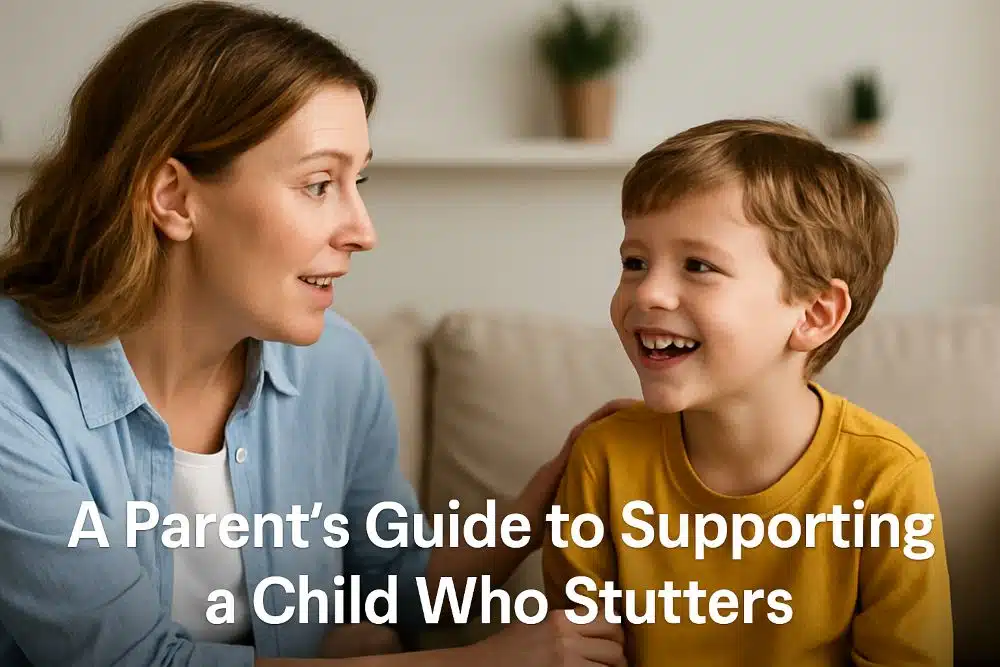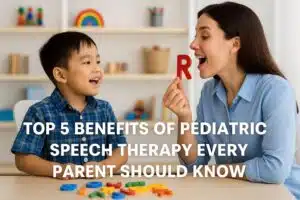Imagine this: You’re sitting at the dinner table, listening to your little one excitedly tell a story about their day—and you notice they pause, struggling to get some words out. Your heart races. You want to help but aren’t sure how. If you’ve ever felt this way, you’re not alone. As pediatric therapy specialists at Uplift Therapy Center, we believe that early support and compassionate guidance can make all the difference. With years of experience helping children find their voice, we’re here to walk alongside you every step of the way.
Did you know? Roughly 5% of all children experience a period of stuttering, but only 1% continue into adulthood. Early support truly matters!
Understanding Why Children Stutter
What Causes Stuttering in Children?
Stuttering is a complex communication difference often involving genetic, neurological, and environmental factors. From our firsthand experience, we know that stuttering is not a sign of a child’s intelligence or emotional stability. Every child communicates uniquely, and honoring their journey is essential. Sometimes, factors such as oral sensory seeking behaviors may intersect with communication development.
Myths About Childhood Stuttering
We’ve seen how persistent myths create unnecessary fears. It’s vital to know:
- Stuttering isn’t caused by nervousness.
- It isn’t the result of parenting styles.
- Trauma isn’t the origin, though stress can influence fluency.
Understanding these truths helps you focus on what matters: supporting, not fixing.
Recognizing the Early Signs of Stuttering
Common Early Signs
Recognizing early signs empowers parents to act thoughtfully:
- Repeating sounds, syllables, or words (“b-b-ball”)
- Prolonging sounds (“mmmmom”)
- Struggling to get words out
- Facial tension while speaking
- Frequent fillers like “um” and “uh”
It’s helpful to understand The Power of Imitation and how it can interplay with these early signs.
When to Monitor and When to Act
Mild stuttering between ages 2-5 is normal. But if it:
- Lasts longer than six months
- Becomes more frequent or intense
- Causes visible frustration
…then consulting a speech therapist is a smart next step.
How to Help a Child Who Stutters at Home
Everyday Communication Strategies
At Uplift Therapy Center, we often coach families to:
- Listen patiently: Avoid rushing or interrupting.
- Maintain natural eye contact: Focus on their message, not their disfluency.
- Model slow, calm speech: Speak at an easy pace without instructing them to “slow down.”
- Create calm speaking environments: Reduce pressure during conversations. Using sensory strategies to support communication can be particularly helpful.
Tips for Building Confidence and Reducing Anxiety
Building confidence starts with your reactions:
- Praise effort, not perfection.
- Normalize speech challenges: “Everyone finds words tricky sometimes.”
- Avoid finishing sentences for them.
Managing Emotional Responses (Both Child & Parent)
It’s okay to feel worried. Staying calm and offering validation (“I love hearing what you have to say”) can make a huge difference.
If you feel like you need support, reach out to us for a consultation with a speech therapist today!
Progress Tracker Tip:
Keep a simple journal noting:
- Days when speech seems easier
- Situations that make speaking harder
- Emotional responses before and after speaking events
Bonus Tip: Bring this journal to your therapy sessions! It helps tailor strategies to your child’s real-world experiences.
When to Seek Professional Help
How Speech Therapy for Stuttering Can Help
Speech therapy focuses not just on fluency, but building communication confidence. Children learn:
- Strategies to ease speaking effort
- Techniques to handle stuttering moments
- Ways to build self-esteem around communication
Finding the Right Speech Therapist
Find someone experienced with pediatric stuttering—someone who makes therapy feel safe and fun.
What to Expect in Early Intervention Therapy Sessions
Our sessions at Uplift Therapy Center involve:
- Building trust through playful interaction
- Observing speech patterns naturally
- Coaching parents to integrate strategies at home
- Setting realistic, empowering goals
Ready to start supporting your child’s communication journey? Early support can transform your child’s communication journey.
[Contact Uplift Therapy Center for a free consultation today!]
Creating a Supportive Environment
Talking to Teachers, Family, and Friends About Stuttering
Proactive communication can ease your child’s path. Tips include:
- Encourage adults to listen without interrupting.
- Ask teachers to allow extra time for speaking activities.
- Educate family members on patient conversation habits. Understanding The 8 Senses can provide even deeper insights.
Advocating for Your Child in Social Settings
Practice role-play scenarios so your child feels prepared.
- Teach simple phrases like “Give me a moment” to buy time.
- Boost confidence through gentle encouragement after social events.
FAQs About Childhood Stuttering
Can stuttering go away on its own?
Often yes, especially with early childhood cases. But supportive intervention improves outcomes.
Is stuttering caused by emotional trauma?
No. It’s usually genetic and neurological, not emotional.
How long does speech therapy usually take?
Every child is unique; some improve within months, others need longer support.
Can stuttering be completely cured?
Some children fully recover; others manage stuttering successfully with confidence.
Conclusion
Helping a child who stutters isn’t about eliminating differences—it’s about nurturing their ability to express themselves with pride. At Uplift Therapy Center, our compassionate, expert-guided approach has empowered countless families. Early support, combined with empathy and skilled therapy, sets the stage for a lifetime of confident communication.
If you need help supporting a child who stutters, reach out to us here for a consultation.
More Questions Parents Ask About Stuttering
What are early signs that my child might be stuttering?
Early signs of stuttering can include repeating sounds or words (like “b-b-ball”), prolonging sounds (“mmmmom”), struggling to start words, facial tension while speaking, and frequent use of filler words like “um” or “uh.” If you notice these signs, especially if they cause frustration, it may be time to monitor speech development more closely.
When should I take my child to a speech therapist for stuttering?
If your child’s stuttering lasts longer than six months, worsens over time, causes emotional distress, or involves noticeable physical tension during speech, it’s a good idea to consult a speech therapist. Early intervention can significantly improve outcomes and boost your child’s communication confidence.
How can I support my child emotionally if they stutter?
Support your child by listening patiently, maintaining natural eye contact, praising their efforts rather than focusing on fluency, and normalizing speech challenges. Create a calm and supportive communication environment at home, and reassure them that everyone sometimes has difficulty finding the right words.
Can stuttering get worse without treatment?
For some children, stuttering may naturally resolve over time. However, without supportive strategies or professional intervention, stuttering can sometimes become more persistent or emotionally challenging. Early support helps reduce frustration and builds the skills needed for confident communication.
Links and Resources
- What Is Stuttering? Diagnosis & Treatment | NIDCD
(https://www.nidcd.nih.gov/health/stuttering) - NIH Grant Funds Innovative Study on Childhood Stuttering
(https://artsandsciences.syracuse.edu/news-all/news-from-2021/nih-grant-funds-innovative-study-on-childhood-stuttering/)




